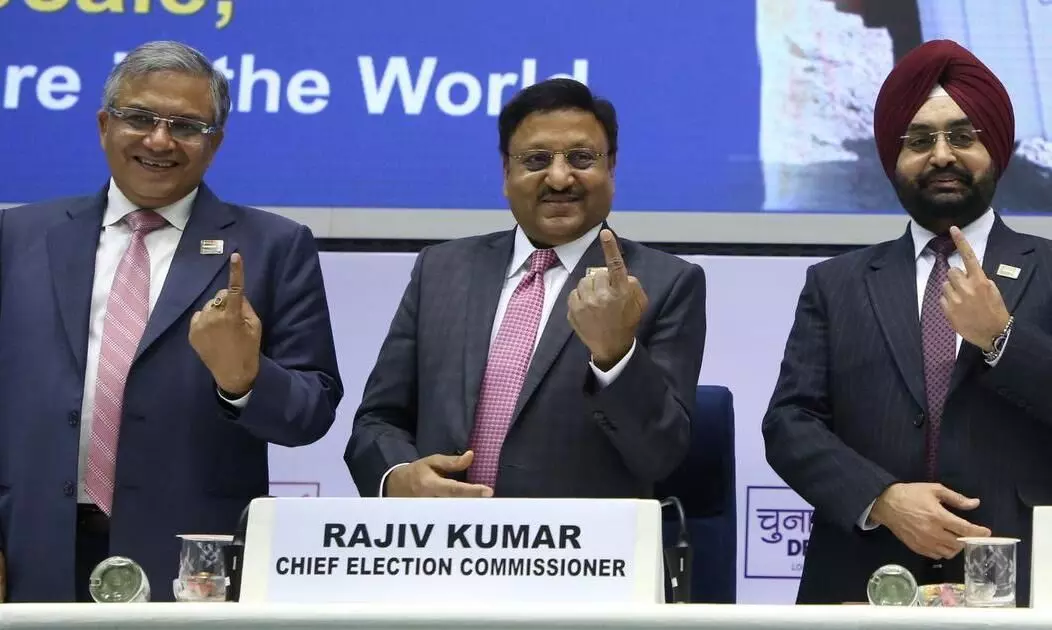
Election Commission, not an impartial umpire but a player: Experts
text_fieldsIn the throes of India’s electoral season, the Election Commission (EC) finds itself embroiled in a storm of controversy, with allegations of bias, opacity, and a perceived lack of autonomy tarnishing its once-revered reputation. Long hailed as the bedrock of India’s democracy, the EC now stands accused of failing to uphold the principles of fairness and impartiality that are essential to the electoral process.
At the heart of the criticism lies a series of contentious issues that have plagued the EC in recent months. From questions surrounding the impartiality of its appointments to concerns over its handling of electoral bonds and the scheduling of elections, the EC has found itself under intense scrutiny from political scientists, scholars, and opposition figures alike.
One of the most vocal critics of the EC is Suhas Palshikar, a prominent political scientist and chief editor of Studies in Indian Politics. Palshikar has been scathing in his assessment of the EC, declaring that its autonomy and powers have been effectively eroded, leaving India’s democracy vulnerable to manipulation, according to a report published in The Wire.
Similarly, Zoya Hasan, a Professor Emerita at JNU, has raised serious doubts about the EC’s impartiality, citing repeated violations of the Model Code of Conduct and a perceived reluctance to take action against those who flout electoral laws. Hasan argues that the system of executive appointments undermines the independence of the EC, further undermining public trust in the electoral process.
The recent exchange between the EC and Congress President Mallikarjun Kharge has only served to intensify scrutiny of the commission. Kharge’s questions regarding voter turnout data were met with a response from the EC that was characterized by critics as dismissive and defensive, further fuelling concerns about the commission’s impartiality.
Gilles Verniers, a seasoned scholar with decades of experience in Indian politics, has described the current state of the EC as a “low point,” suggesting that much of the scepticism it faces is self-inflicted. Verniers' sentiment echoes that of many observers who fear that the EC’s credibility has been irreparably damaged.
Yogendra Yadav, a well-known psephologist and political commentator, has gone so far as to accuse the EC of abandoning its role as an impartial arbiter and instead aligning itself with the ruling party. Yadav’s remarks underscore the deep-seated concerns about the EC’s perceived partisanship.
Former EC Ashok Lavasa has also weighed in on the debate, suggesting that the commission’s actions will be judged by its relationship with the ruling party rather than its commitment to impartiality. Lavasa’s comments highlight the broader challenge facing the EC in maintaining its independence in the face of political pressure.
In response to mounting criticism, an INDIA delegation has met with the EC to convey concerns about transparency and trust deficit. Opposition representatives have raised alarm over delays in the release of voter turnout data and have called for measures to maintain the credibility of the electoral process.
Meanwhile, the Association for Democratic Reforms (ADR) has filed an application in the Supreme Court seeking to compel the EC to publish absolute numbers of votes polled immediately. ADR alleges that delays in the release of turnout data and discrepancies in reported figures have raised suspicions about the accuracy of the data.
With trust in the commission at an all-time low and concerns about its impartiality mounting, the EC faces an uphill battle to restore public confidence and safeguard the integrity of India’s electoral process.























